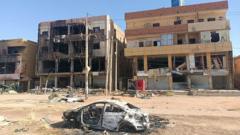In a recent Senate foreign relations hearing, Rubio emphasized the urgency of supporting Syria's transitional authorities, asserting the country is on the verge of a catastrophic civil war. This alert comes amidst escalating sectarian violence, including recent clashes that resulted in over 100 deaths, raising alarm about the stability of the region post-Assad.
Rubio: Syria on Brink of Full-Scale Civil War

Rubio: Syria on Brink of Full-Scale Civil War
US Secretary of State Marco Rubio issues a dire warning about Syria, claiming the nation may be weeks away from collapse and civil conflict.
In a pivotal Senate Foreign Relations Committee hearing, U.S. Secretary of State Marco Rubio issued a stark warning that Syria could be mere weeks away from "potential collapse and a full-scale civil war of epic proportions." He stressed the critical need for international support for the transitional authorities, following incidents that have reignited fears of instability in the war-torn nation.
Rubio defended President Donald Trump's recent decision to lift sanctions on Syria, a move aimed at facilitating aid and support for newly appointed President Ahmed al-Sharaa, previously an al-Qaeda commander who has managed to lead a rebel movement against former President Bashar al-Assad. This marked a significant shift in U.S. policy, allowing other countries to engage with Syria without the fear of economic penalties.
The backdrop to this unfolding situation includes a devastating 13-year civil war that has claimed over 600,000 lives and displaced 12 million people. Rubio noted that despite Sharaa's assurances to protect minority communities, recent violence has underscored deep-seated divisions, particularly between Sunnis and other religious groups.
The implications of these developments were highlighted by the increasing urgency felt across Syria's factions. Rubio's remarks reflect concerns regarding the potential fragmentation of the country if transitional authority fails. He noted that the minorities in Syria, having been deliberately pitted against one another during the Assad regime, are continuing to deal with profound internal distrust amid significant uncertainty.
As the international community watches closely, the European Union foreign ministers have also shown openness to lifting sanctions, indicating a collective desire to foster a stable and inclusive future for Syria. Amidst this tumult, Syrian officials have greeted the sanction relief as the dawn of a new chapter in relations with Europe, amidst an atmosphere of cautious optimism and guarded skepticism.
As analysts and policymakers continue to assess the evolving landscape in Syria, Rubio’s warnings highlight the precarious state of a nation still reeling from years of conflict, with the potential for renewed widespread violence looming just on the horizon.
Rubio defended President Donald Trump's recent decision to lift sanctions on Syria, a move aimed at facilitating aid and support for newly appointed President Ahmed al-Sharaa, previously an al-Qaeda commander who has managed to lead a rebel movement against former President Bashar al-Assad. This marked a significant shift in U.S. policy, allowing other countries to engage with Syria without the fear of economic penalties.
The backdrop to this unfolding situation includes a devastating 13-year civil war that has claimed over 600,000 lives and displaced 12 million people. Rubio noted that despite Sharaa's assurances to protect minority communities, recent violence has underscored deep-seated divisions, particularly between Sunnis and other religious groups.
The implications of these developments were highlighted by the increasing urgency felt across Syria's factions. Rubio's remarks reflect concerns regarding the potential fragmentation of the country if transitional authority fails. He noted that the minorities in Syria, having been deliberately pitted against one another during the Assad regime, are continuing to deal with profound internal distrust amid significant uncertainty.
As the international community watches closely, the European Union foreign ministers have also shown openness to lifting sanctions, indicating a collective desire to foster a stable and inclusive future for Syria. Amidst this tumult, Syrian officials have greeted the sanction relief as the dawn of a new chapter in relations with Europe, amidst an atmosphere of cautious optimism and guarded skepticism.
As analysts and policymakers continue to assess the evolving landscape in Syria, Rubio’s warnings highlight the precarious state of a nation still reeling from years of conflict, with the potential for renewed widespread violence looming just on the horizon.



















